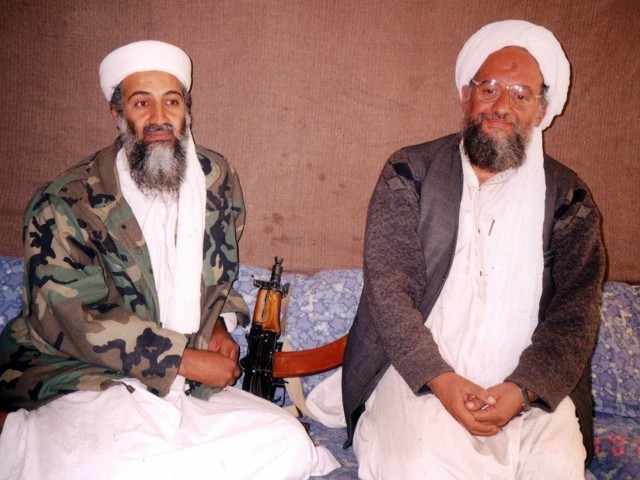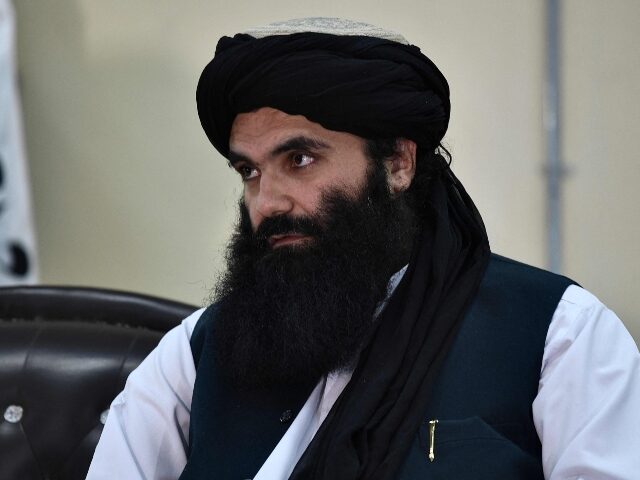Taliban “interior minister” Sirajuddin Haqqani, who several reports claim may have owned the home where a U.S. airstrike eliminated al-Qaeda leader Ayman al-Zawahiri a little over a week ago, launched a tour of remote Helmand province this weekend to applaud the “jihadi achievements” of its people.
Sirajuddin Haqqani is one of the most senior leaders of both the Taliban terrorist group and its affiliate, the Haqqani Network, which has for years served as a bridge between the Taliban and al-Qaeda. Haqqani told the Indian outlet News 18 in an interview days before the airstrike on Zawahiri that al-Qaeda “has no presence in Afghanistan” and has played a major role in attempting to rebrand the Taliban as an “inclusive” and peaceful government entity. In 2020, Haqqani became a published New York Times contributor, penning an article titled “What We, the Taliban, Want.”
The administration of President Joe Biden bizarrely claimed shortly after the Taliban conquest of Afghanistan last year that the Haqqani Network and Taliban were “separate entities.”
Addressing a crowd in Helmand – an opium hotbed and longtime Taliban stronghold – on Saturday, Sirajuddin Haqqani emphasized that, unlike the Taliban’s initial claims of building an “inclusive” government last year, the jihadists would not accept any government outside of the confines of its fundamentalist interpretation of sharia, or the Islamic law.
“Don’t sit on the hopes of others, there are some talk saying ‘accept this and we will accept that with you,’ if we had accepted these with you, we would have not fought you for the last 20 years. We accept but based on the Islamic and national principles,” Haqqani said, according to Afghanistan’s Tolo News. The news network observed that Haqqani spent much of his address telling his audience to work on rebuilding the country in the aftermath of the 20-year war against America and promising that the Taliban jihadists would government with “good morals.”
The Taliban’s Interior Ministry, which Haqqani runs, published images of his visit to the remote location. At a stop in Sangin town, where the Taliban fought some of its most intense battles, Haqqani reportedly took the opportunity to thank locals for their “sacrifices” to return the Taliban to power. Haqqani called Sangin a “shining example of jihadi achievements during the 20-year struggle,” according to the Interior Ministry.
سنګين ولسوالۍ د شل کلنې مبارزې پر مهال د جهادي کارنامو ځلانده مثال دى، ددې ولسونو مېړانې او قربانۍ هېڅکله بايد هېرې نه شي
د کورنيو چارو وزير قدرمن خليفه صاحب سراج الدين حقاني هلمند ولايت ته د خپل سفر پر دويمه ورځ د سنګين لرې پرتې ولسوالۍ ته ولاړ او..
۱/۳ pic.twitter.com/NisnvDxG6y— Ministry of Interior Affairs- Afghanistan (@moiafghanistan) August 7, 2022
Haqqani is one of the world’s most wanted criminals, in addition to maintaining a cabinet-level position within the Taliban government. The FBI is offering up to $10 million for information leading to his arrest and still accepting tips as to his whereabouts, despite the fact that the Taliban openly publishes photos of him in public engagements. As of Monday, Afghan news sites reported that Haqqani was still touring Helmand.
#AFG “Taliban interior minister Sirajudin Haqqani visited Sangeen district in Helmand province. As part of his visit to Helmand.” Aid close to the Taliban interior minister tells me. Photos shared by aid close to Taliban interior minister. pic.twitter.com/OkTsWm1jzy
— BILAL SARWARY (@bsarwary) August 7, 2022
Acting Interior Minister Sirajuddin Haqqani visited Kajaki hydroelectric power plant in Helmand. He said protection of infrastructural projects would lead Afghanistan toward self-reliance.#ArianaNews #SirajuddinHaqqani #Helmand pic.twitter.com/HZdfPeMMlr
— Ariana News (@ArianaNews_) August 8, 2022
“Under his leadership, HQN has planned and conducted numerous significant kidnappings and attacks against U.S. and Coalition Forces in Afghanistan, the Afghan government, and civilian targets,” according to the FBI. “In 2015, Sirajuddin was appointed deputy leader of the Taliban, cementing the alliance between HQN and the Taliban.”
Haqqani used the title “deputy leader of the Taliban” for his feature in the far-left New York Times. Rather than praise jihadists for their violence, as he did this weekend, Haqqani used the “inclusivity” rhetoric the Taliban was still crafting in 2020, but perfected following the fall of Kabul in August 2021, to urge the West to sympathize with its cause.
“We are committed to working with other parties in a consultative manner of genuine respect to agree on a new, inclusive political system in which the voice of every Afghan is reflected and where no Afghan feels excluded,” Haqqani wrote in the pages of America’s most prominent newspaper. “We did not choose our war with the foreign coalition led by the United States. We were forced to defend ourselves. The withdrawal of foreign forces has been our first and foremost demand.”
“I am confident that, liberated from foreign domination and interference, we together will find a way to build an Islamic system in which all Afghans have equal rights,” Haqqani wrote, “where the rights of women that are granted by Islam — from the right to education to the right to work — are protected, and where merit is the basis for equal opportunity.”
Haqqani also claimed that “reports about foreign groups in Afghanistan are politically motivated exaggerations by the warmongering players on all sides of the war,” denying that al-Qaeda or other jihadists had any alliances with the Taliban. Haqqani was making the same claim two years later in the News18 interview from late July.
“And as far as Al-Qaeda is concerned, it has no presence in Afghanistan and is no more of a threat and the world should not feel threatened about the already dead outfit,” Haqqani said. “Some western forces, which are trying to destabilise the country, are being taken care of by the Islamic Emirate of Afghanistan.”
Zawahiri’s presence in a wealthy neighborhood of Kabul, the national capital, greatly undermined Haqqani’s claims. Reports following the confirmation of a U.S. airstrike killing him indicated that the septuagenarian terrorist spent much of his time loitering on his balcony, from which passersby could easily see him.

Osama bin Laden (L) sits with his adviser Ayman al-Zawahiri, an Egyptian linked to the al Qaeda network, at an undisclosed location in Afghanistan. (Photo by Visual News/Getty Images)
The ownership of the home where the airstrike occurred is also a matter of suspicion: multiple outlets, including Haqqani’s publisher the New York Times, claim that sources believe Haqqani owns the house. Haqqani has not addressed the allegations.
Through its top spokesman, Zabihullah Mujahid, the Taliban denied having any information regarding Zawahiri’s presence in Kabul at all last week.
“The Islamic Emirate of Afghanistan [the Taliban] has no information about Ayman al-Zawahiri’s arrival and stay in Kabul,” Mujahid said in a statement. “The leadership of the Islamic Emirate of Afghanistan has instructed the investigative and intelligence agencies to conduct a comprehensive and serious investigation into the various aspects of the incident.”
The Taliban condemned the airstrike as a violation of Afghanistan’s sovereignty.

COMMENTS
Please let us know if you're having issues with commenting.